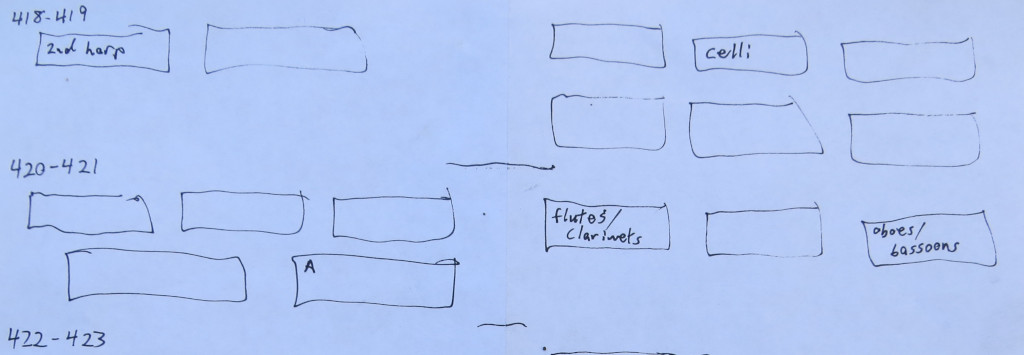I was really looking forward to this one: classical music? Check. Parser/choice hybrid interface? I’m down for interface experiments. Engage with the puzzle or just explore the scene? Great.
But…I’ve started it four times over the last several days and the first couple times I was lost within the first few turns. The third time I just did nothing the whole time. This last time I started to really dig into it and got about a third of the way through before I lost the thread.
I can see what it’s trying to do, and I like it, but I don’t think it quite works in its current form. For me the story/setting and mechanics were at war the entire time. Is it a charming and very authentic-feeling mood piece about community orchestra, or is it an exhausting parser puzzle about finding the perfect 80-turn move sequence? Is it a game about looking around and reflecting on the quirks of your musicians, or one about micromanaging the actions of conducting a piece? They just don’t quite work together for me.
So. The setup is that you’re conducting a community orchestra in a performance of Tchaikovsky’s Pas de Deux from the Nutcracker. One measure of music passes per turn: there are no free actions (I don’t think?). You can cue different sections or instruments by looking at them (or sometimes confuse them by looking at someone near them). You play through the whole piece and then get a review in the paper the next day.
If you’re going to play this, you should definitely print out the score (and possibly the seating chart) and mark it up. There are 24 staves of music on each page, and they’re not labeled by instrument except on the first. I do choral music and solo piano, so I’m very comfortable with 2-8 staves, but this is still well beyond my ability to easily follow just by having it open in a window side-by-side with the game.
Oh. And the game doesn’t start with the (simulated) score open. So if you don’t do that, you’ll be completely lost until you figure it out. You need to tell the game to open the score and when to turn each page: then it follows along and tells you where you are (e.g. “the third bar on the right-hand page”; “you turn to pages 422-423”, etc.) and when you turn the page it describes the music and often mentions a cue that you’ll need to give (though not every cue: it’s still a puzzle, after all).
With a paper score to mark up, and the score open in-game, it should be fairly manageable. You can undo repeatedly, so as long as you have a good way to mark where you are, you can back up and try to fix what you did wrong.
Also, you should play it as a strictly parser game (though you’ll need to use your mouse to scroll the transcript, unfortunately). If you’re just playing to take in the scenery you can do it purely with the mouse, but some commands you’ll need to give are not necessarily available to click on. Yeah. Dialog has made very impressive strides, but the interpreter still isn’t quite there yet. It really really really needs to restore keyboard focus to the input area after you click a link, and to allow you to page up/down to scroll the transcript while you’re typing. It’s really tempting to play in a mixed mode, but the interface makes that pretty frustrating: you’re constantly having to click back on the (relatively tiny) target at the bottom left to be able to type again.
I like that the game is so forgiving. You seem to be able to undo indefinitely, and the only mechanical consequence of getting it wrong is that you get a bad review in the paper the next day. But! As someone who has done a lot of choral singing, it’s really fucking bad to let your musicians down like that in a public performance. Conductors who do that should be shot, preferably after undergoing a long period of agonizing torture.
So that didn’t work for me at all. If it were re-framed as a series of rehearsals, and then you decide when you’re ready for the full performance (or something) it would be much better. I’ve just been playing @Spike’s Sugarlawn which is framed as a “reality” show where you can back up and cut sections of tape, or re-tape the whole thing at any time, and I think some sort of in-world framing to that effect would work really well here.
But I will be printing out the score and giving this another go, because I like what it’s trying to do. And the atmosphere and the descriptions of orchestra members are spot-on. It just asks a lot of the player for what it is, I think.

